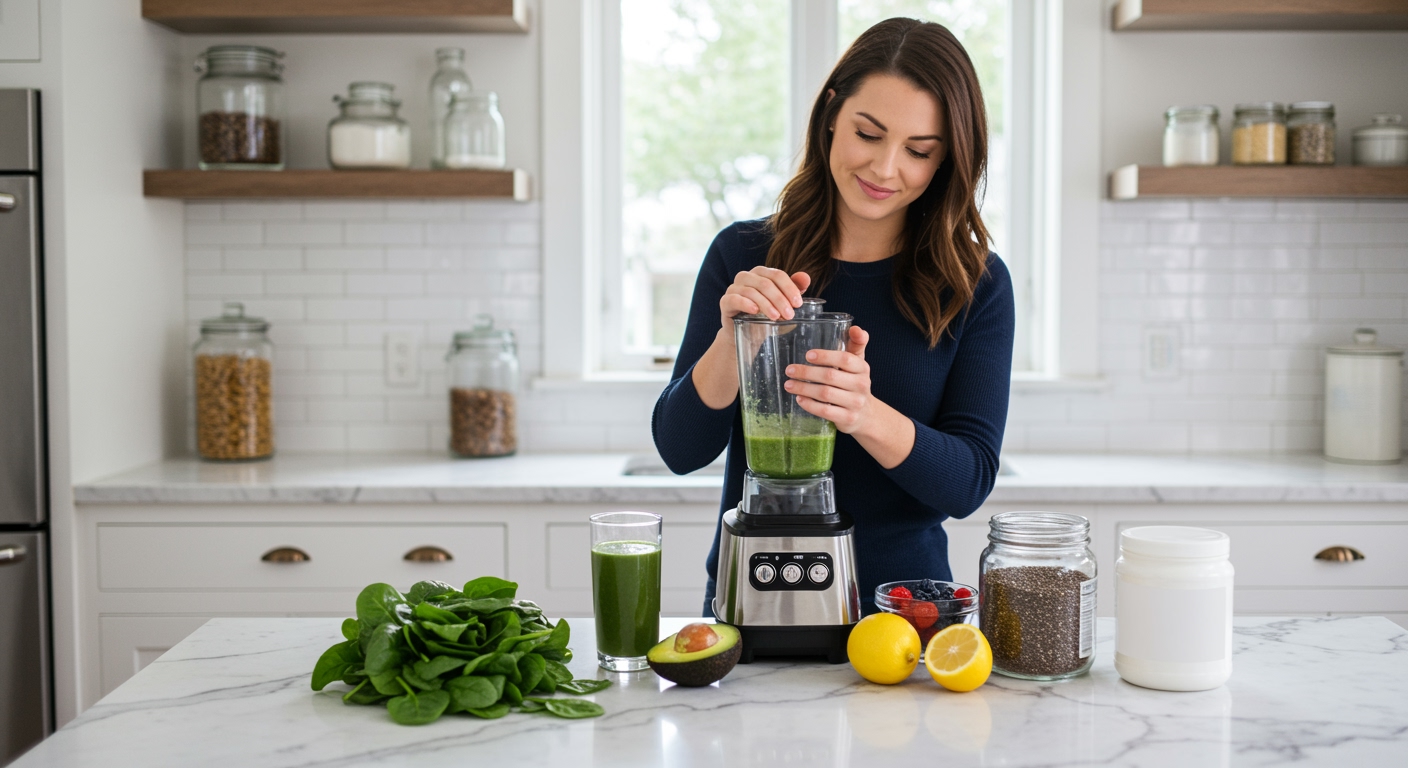✪ Key Takeaway: Smoothies can help with PCOS when they include protein, healthy fats, and low-glycemic ingredients to balance blood sugar and hormones.
Introduction
You grab your favorite fruits, toss them in a blender, and think you are making a healthy choice for your PCOS.
But that fruit-heavy smoothie might be sabotaging your hormone balance and making your symptoms worse.
Hi, I am Abdur, your nutrition coach, and today I am going to explain how smoothies can actually help with PCOS when you build them the right way.
Why Do Most PCOS Smoothies Fail?
Most women with PCOS make smoothies loaded with high-sugar fruits like bananas, mangoes, and pineapples.
These fruits cause rapid blood sugar spikes that trigger insulin resistance, the root cause of most PCOS symptoms.
When your insulin levels stay elevated, your body produces more androgens like testosterone.
Higher androgen levels lead to irregular periods, weight gain around your midsection, and unwanted hair growth.
The problem gets worse when you add fruit juices, honey, or dates to make your smoothie taste better.
Your body treats these liquid sugars like a direct injection of glucose into your bloodstream.
✪ Fact: A typical fruit smoothie can contain 40-60 grams of sugar, equivalent to drinking 1.5 cans of soda.
What Makes A Smoothie PCOS-Friendly?
A PCOS-friendly smoothie must include three essential components: protein, healthy fats, and fiber.
Protein helps slow down sugar absorption and keeps your blood glucose levels stable for hours.
Healthy fats like those from avocados, nuts, or seeds provide sustained energy without triggering insulin spikes.
Fiber from leafy greens and low-glycemic vegetables creates a gel-like substance in your stomach that slows digestion.
This combination helps your body maintain steady hormone production instead of the rollercoaster effect from high-sugar smoothies.
The key is keeping your total carbohydrate content under 15 grams per serving while maximizing nutrient density.
✪ Pro Tip: Add 1-2 tablespoons of ground flaxseed to boost omega-3 fatty acids and lignans that help balance estrogen levels.
Which Ingredients Should You Include?
Start with leafy greens like spinach, kale, or Swiss chard as your base ingredient.
These vegetables provide folate, magnesium, and antioxidants that support healthy ovulation and reduce inflammation.
Add a high-quality protein source like unsweetened protein powder, Greek yogurt, or hemp seeds.
Include healthy fats from half an avocado, almond butter, or a handful of walnuts.
For natural sweetness without the sugar spike, use small amounts of low-glycemic berries like blueberries or raspberries.
Cinnamon is your secret weapon because it helps improve insulin sensitivity and adds natural sweetness.
Unsweetened coconut milk or almond milk provides the liquid base without added sugars or hormones.
✪ Note: Spearmint tea as your liquid base can help reduce excess androgen levels naturally.
When Should You Drink Your PCOS Smoothie?
Timing matters just as much as ingredients when it comes to hormone balance.
The best time to drink your PCOS smoothie is within 30 minutes after a workout.
Your muscles act like sponges after exercise, pulling glucose from your bloodstream more efficiently.
This means even the natural sugars from berries get used for muscle recovery instead of triggering insulin resistance.
If you are not exercising, drink your smoothie as a mid-morning snack rather than on an empty stomach.
Having some food in your system helps slow down absorption and prevents blood sugar crashes.
✪ Pro Tip: Never drink smoothies late at night as your insulin sensitivity naturally decreases in the evening hours.
How Do Smoothies Support Long-Term PCOS Management?
Well-designed smoothies provide concentrated nutrition that many women with PCOS struggle to get from regular meals.
The high antioxidant content from berries and leafy greens helps reduce chronic inflammation linked to insulin resistance.
Regular consumption of protein-rich smoothies helps maintain stable blood sugar throughout the day.
This stability reduces cravings for processed foods and helps break the cycle of emotional eating.
The fiber content supports healthy gut bacteria, which play a crucial role in hormone metabolism.
Over time, this approach helps restore natural ovulation patterns and reduces the severity of PCOS symptoms.
✪ Fact: Studies show that consistent blood sugar management can restore regular menstrual cycles in 70% of women with PCOS within 6 months.
The Bottom Line
Smoothies can absolutely help with PCOS when you focus on blood sugar balance instead of just taste.
Your smoothie should work for your hormones, not against them.
I would love to hear about your experience with PCOS-friendly smoothies or any questions you might have about managing your symptoms naturally in the comments below.
References
At NutritionCrown, we use quality and credible sources to ensure our content is accurate and trustworthy. Below are the sources referenced in writing this article:
- National Center for Biotechnology Information: Polycystic Ovary Syndrome and Insulin Resistance
- Mayo Clinic: Polycystic Ovary Syndrome (PCOS) – Symptoms and Causes
- Cleveland Clinic: Polycystic Ovary Syndrome (PCOS)
- Better Health Victoria: Polycystic Ovarian Syndrome (PCOS)





